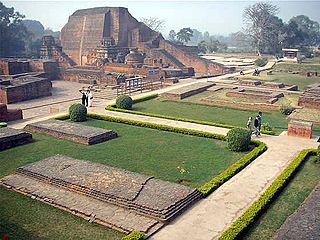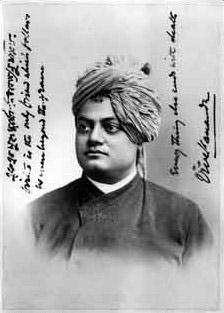
Buddhist philosophy is the ancient Indian philosophical system that developed within the religio-philosophical tradition of Buddhism. It comprises all the philosophical investigations and systems of rational inquiry that developed among various schools of Buddhism in ancient India following the parinirvāṇa of Gautama Buddha, as well as the further developments which followed the spread of Buddhism throughout Asia.
The relationship between Buddhism and science is a subject of contemporary discussion and debate among Buddhists, scientists and scholars of Buddhism. Historically, Buddhism encompasses many types of beliefs, traditions and practices, so it is difficult to assert any single "Buddhism" in relation to science. Similarly, the issue of what "science" refers to remains a subject of debate, and there is no single view on this issue. Those who compare science with Buddhism may use "science" to refer to "a method of sober and rational investigation" or may refer to specific scientific theories, methods or technologies.

Indian philosophy consists of philosophical traditions of the Indian subcontinent. A traditional Hindu classification divides āstika and nāstika schools of philosophy, depending on one of three alternate criteria: whether it believes the Vedas as a valid source of knowledge; whether the school believes in the premises of Brahman and Atman; and whether the school believes in afterlife and Devas.
Rebirth in Buddhism refers to the teaching that the actions of a sentient being lead to a new existence after death, in an endless cycle called saṃsāra. This cycle is considered to be dukkha, unsatisfactory and painful. The cycle stops only if Nirvana (liberation) is achieved by insight and the extinguishing of craving. Rebirth is one of the foundational doctrines of Buddhism, along with karma and Nirvana. Rebirth was a key teaching of early Buddhism along with the doctrine of karma. In Early Buddhist Sources, the Buddha claims to have knowledge of his many past lives. Rebirth and other concepts of the afterlife have been interpreted in different ways by different Buddhist traditions.

Dharmakīrti, was an influential Indian Buddhist philosopher who worked at Nālandā. He was one of the key scholars of epistemology (pramāṇa) in Buddhist philosophy, and is associated with the Yogācāra and Sautrāntika schools. He was also one of the primary theorists of Buddhist atomism. His works influenced the scholars of Mīmāṃsā, Nyaya and Shaivism schools of Hindu philosophy as well as scholars of Jainism.
Paul J. Griffiths is an English-born American theologian. He was the Warren Professor of Catholic Thought at Duke Divinity School.

A śramaṇa or samaṇa is a person "who labours, toils, or exerts themselves for some higher or religious purpose" or "seeker, one who performs acts of austerity, ascetic". During its development, the term came to refer to several non-Brahmanical ascetic religious movements parallel to but separate from the Vedic religion's inclusive Sramana sannyasis like the Daśanāmis. The exclusive Śramaṇa tradition includes primarily Jainism, Buddhism, and others such as the Ājīvika.
The University of Chicago Divinity School is a private graduate institution at the University of Chicago dedicated to the training of academics and clergy across religious boundaries. Formed under Baptist auspices, the school today lacks any sectarian affiliations.

Buddhism has interacted with several Eastern religions such as Taoism, Shinto and Bon since it spread from the Indian subcontinent during the 2nd century AD.
Kumārila Bhaṭṭa was a Hindu philosopher and a scholar of Mimamsa school of philosophy from early medieval India. He is famous for many of his various theses on Mimamsa, such as Mimamsaslokavarttika. Bhaṭṭa was a staunch believer in the supreme validity of Vedic injunction, a champion of Pūrva-Mīmāṃsā and a confirmed ritualist. The Varttika is mainly written as a subcommentary of Sabara's commentary on Jaimini's Purva Mimamsa Sutras. His philosophy is classified by some scholars as existential realism.

Buddhism and Hinduism have common origins in the culture of Ancient India. Buddhism arose in the Gangetic plains of Eastern India in the 5th century BCE during the "second urbanisation". Hinduism developed as a fusion or synthesis of practices and ideas from the ancient Vedic religion and elements and deities from other local Indian traditions. This Hindu synthesis emerged after the Vedic period, between 500-200 BCE and c. 300 CE, in or after the period of the Second Urbanisation, and during the early classical period of Hinduism, when the Epics and the first Puranas were composed.

Richard Francis Gombrich is a British Indologist and scholar of Sanskrit, Pāli, and Buddhist studies. He was the Boden Professor of Sanskrit at the University of Oxford from 1976 to 2004. He is currently Founder-President of the Oxford Centre for Buddhist Studies. He is a past president of the Pali Text Society (1994–2002) and general editor emeritus of the Clay Sanskrit Library.
Christian Konrad Wedemeyer is an American scholar and political and social activist.

Stephen T. Asma is Professor of Philosophy and Distinguished Scholar at Columbia College Chicago. He is also a Senior Fellow of the Research Group in Mind, Science, and Culture at Columbia College Chicago.
Buddhist modernism are new movements based on modern era reinterpretations of Buddhism. David McMahan states that modernism in Buddhism is similar to those found in other religions. The sources of influences have variously been an engagement of Buddhist communities and teachers with the new cultures and methodologies such as "Western monotheism; rationalism and scientific naturalism; and Romantic expressivism". The influence of monotheism has been the internalization of Buddhist gods to make it acceptable in modern Western society, while scientific naturalism and romanticism has influenced the emphasis on current life, empirical defense, reason, psychological and health benefits.
Evan Thompson is a professor of philosophy at the University of British Columbia. He writes about cognitive science, phenomenology, philosophy of mind, and cross-cultural philosophy, especially Buddhist philosophy in dialogue with Western philosophy of mind and cognitive science.

Buddhist thought and Western philosophy include several parallels.

"Buddhism, the Fulfilment of Hinduism" is a lecture delivered by Indian Hindu monk and expounder Swami Vivekananda on 26 September 1893 at the Parliament of the World's Religions in Chicago. In this lecture, he expressed his opinion that "Buddhism was the fulfilment of Hinduism."
Jay Lazar Garfield is an American professor of philosophy who specializes in Tibetan Buddhism. He also specializes on the philosophy of mind, cognitive science, epistemology, metaphysics, philosophy of language, ethics, and hermeneutics. He is currently Doris Silbert Professor in the Humanities at Smith College, professor of philosophy at the University of Melbourne, visiting professor of philosophy and Buddhist studies at Harvard Divinity School, and Adjunct Professor of Philosophy at the Central University of Tibetan Studies.
The Pramāṇavārttika is an influential Buddhist text on pramana, a form of Indian epistemology. The Pramāṇavārttika is the magnum opus of the Indian Buddhist Dharmakirti.









